"He is like a Taj Mahal. He will never fade away."
On December 11, 1922, Dilip Kumar, a huge star of the Indian film industry was born in Peshawar, British India (present-day Pakistan)
The Bollywood thespian was named Mohammed Yusuf Khan, but he became famous with his on-screen persona as Dilip Kumar.
In a career spanning over five decades, Dilip Sahab came in in over sixty films.
He is familiar to many as the ‘Tragedy King’ due to his expertise and popularity in tragic roles.
However, he also shone while portraying lighter and comedic characters. He was truly a master of his craft.
Dilip Sahab has also inspired many generations of actors. Dozens of younger celebrities have all said that he is their favourite star.
Paying homage to the great Dilip Kumar, we list 20 of his most memorable and best films.
Jugnu (1947)
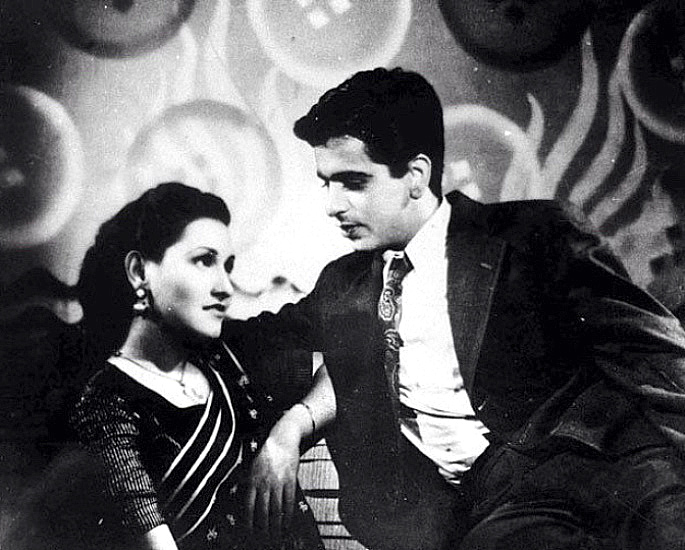
Director: Shaukat Hussain Rizvi
Stars: Dilip Kumar, Noor Jehan
Jugnu was one of the earliest films of Dilip Kumar and his first major hit. Dilip Sahab plays Suraj, a college student madly in love with a girl called Jugnu (Noor Jehan).
In Jugnu, the unique dialogue delivery of Dilip Sahab became a rage with the audience.
The film presents a host of original mannerisms. These include the spontaneous chuckle, the brief pauses between words, and the raising of eyebrows.
All of this was going to hypnotise a nation for decades to come.
In the end, there is a visualisation of Suraj finally proposing to Jugnu. This is only hampered later by the terrible juxtaposition of reality.
Unfortunately, Jugnu dies at the bottom of an unforgiving cliff as shattered Suraj looks down. The expressions of Dilip Sahab are heart-wrenching.
Riashat Azim, a huge fan of Jugnu and Dilip Sahab, speaks of the actor’s modernity for that era on YouTube:
“Dilip Sahab was far, far ahead of time!”
After this film, the audience began to realise that Dilip Sahab was a potential star in the making.
As much as Dilip Sahab is amazing in the film, Noor Ji must be mentioned.
She was a stratospheric singer. Some songs of Jugnu, such as ‘Umangein Dil Ki Machleen‘, are rendered by her.
Andaz (1949)
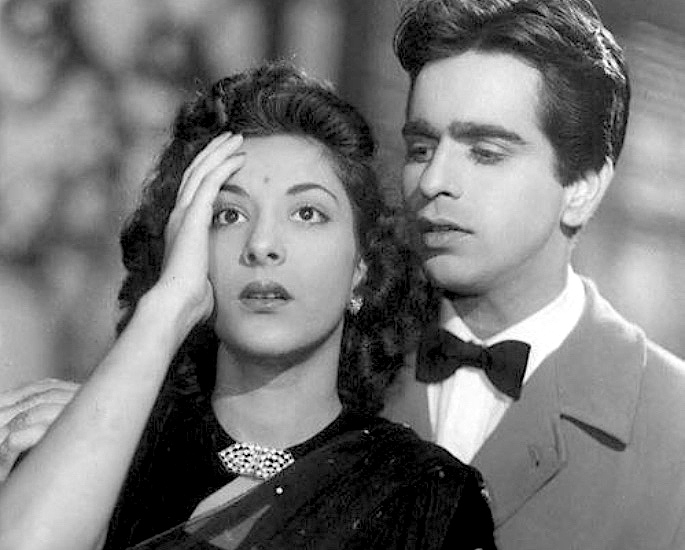
Director: Mehboob Khan
Stars: Nargis, Dilip Kumar, Raj Kapoor
Andaz is a memorable movie, especially as it brings two legends of Indian cinema together – Dilip Kumar and Raj Kapoor.
Raj Ji was splendid in the Andaz, but Dilip Sahab overshadows the Barsaat (1949) star in the film.
The film has a key scene, featuring Dilip (Dilip Kumar), Neena (Nargis), and Rajan (Raj Kapoor).
In the scene, Rajan throws a flower down the stairs and Dilip catches it. However, it does not seem as if this is a catch. It is more like the flower landing in the hands of Dilip.
Dilip’s character was completely effortless in the film. Fatima Nazneen, a fan of the film, compares the two popular actors in the scene:
“Even with Raj Kapoor’s brilliant acting, it feels as if the scene is happening in a movie.
“While Dilip Kumar’s acting feels as if the scene is happening in reality!”
Dilip Sahab becomes the epitome of pent-up anger and frustration during a confrontational scene with Raj Ji.
Towards the end of the film, a head injury means that Dilip becomes mentally challenged. Even though this is one of his early films, Dilip Sahab nails this mindset.
The stammering, the crazed eyes, and the misguided bravado all create a complicated character.
He evokes sympathy and embeds himself in the hearts of the audience long after the film ends.
In Andaz, Dilip Sahab proves that he can make a film memorable despite acting alongside one of his main contemporaries.
Deedar (1951)
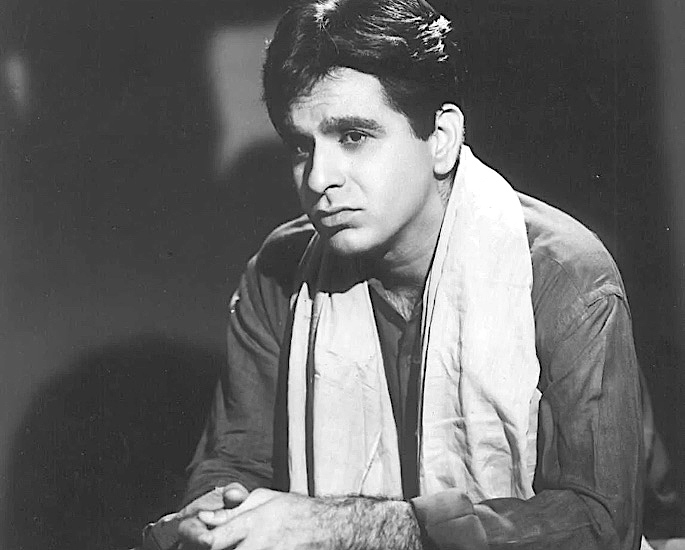
Director: Nitin Bose
Stars: Dilip Kumar, Ashok Kumar, Nargis, Nimmi
Deedar features Dilip Kumar as Shyamu. He is the son of a maid, who both work for Seth Daulatram (Murad).
Shyamu falls in love with his daughter Mala Rai (Nargis). This is not acceptable to Daulatram, who uses Mala’s injury as an excuse to fire Shyamu and his mother.
A merciless journey and a humongous sandstorm cause the death of Shyamu’s mother and his own blindness.
A chain of fateful events brings Mala back into Shyamu’s life. The latter is now making a living as a singer.
Probably one of the finest performances in Bollywood to tackle a blind character, Dilip Sahab submerges into the role.
FirstPost highlight the realism of the performance:
“In the film, Kumar was so real it seemed the actor had actually shut out all light to feel his character’s pain.”
In Dilip Kumar The Substance and the Shadow: An Autobiography, the actor explains that he sought the help of Andaz director Mehboob Khan to prepare for this blind role:
“Mehboob Sahab said I should sit by [a blind beggar]’s side, observe him, try to talk to him, and understand his dark, lonely world.”
The film icon did exactly what Mehboob Ji had suggested, with positivity shining on his heart-breaking, yet memorable character.
Daag (1952)
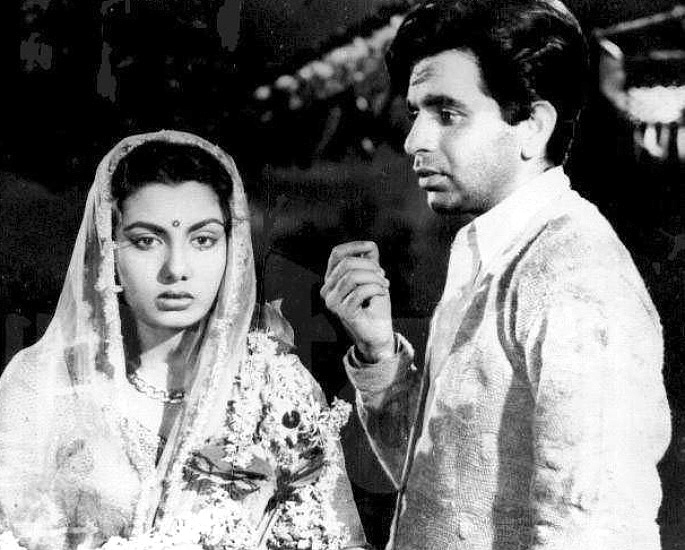
Director: Amiya Chakravarty
Stars: Dilip Kumar, Nimmi, Usha Kiran
Daag features Dilip Kumar as Shankar, who lives with his mother in a woeful life of poverty.
Rising debt lures Shankar into the dark depths of alcoholism. Along his journey, he meets Parvati ‘Paro’ (Nimmi). Her love motivates Shankar to turn himself into a better man.
He works hard in the city and manages to pay off his debts. Upon his return, however, he finds that Paro is engaged. This breaks his heart and he seeks solace in the bottle again.
There is a tear-jerking scene where the mother of Shankar passes away. Shankar’s voice cracks as he laments:
“Maa, I could not do anything. Take me with you. There is nobody left for me here now.”
Dilip Sahab’s expressions are exemplary in the scene and the movie. The audience later finds comfort when Shankar and Paro eventually marry at the end.
Iftikhar Hokher is a big fan of Dilip Sahab. In a 2007 IMDB review, he intellectually concedes that Daag is old-fashioned for an audience of the new millennium.
Despite this, he commends Dilip Sahab’s performance:
“I saw this film many years ago and have seen it several times later. Evidently, it is dated but Dilip Kumar’s acting is superb conveying starkly the traumatic effect of alcoholism.”
The thoughts of Iftikhar aptly describe why Dilip Sahab won the ‘Best Actor’ Filmfare Award for Daag in 1954. He is the first recipient of this accolade.
Daag should be cherished for being a landmark film in Dilip Sahab’s monumental filmography.
Aan (1952)
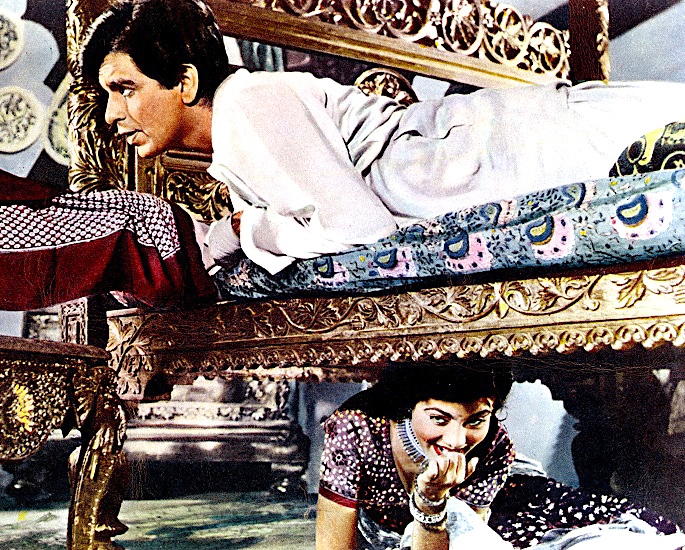
Director: Mehboob Khan
Stars: Dilip Kumar, Nadira, Nimmi, Premnath
Aan is considerably historic for being the first Bollywood colour film. It was an ambitious project that had magic sprinkled on it by Dilip Kumar.
In the film, he plays a villager called Jai Tilak Hada. He falls in love with the stubborn and arrogant Princess ‘Raj’ Rajeshwari (Nadira).
He also has to contend with the fury of the villainous Shamsher Singh (Premnath). The two actors have amazing chemistry.
Aan showcases Dilip Sahab in a swashbuckling and sword-bearing avatar. This is one of his first departures from the tragic roles he had played.
There is a scene in the film where Jai kidnaps the princess. The way he suavely puts his leg over a branch and slams a dagger into a tree is an act of pure brilliance.
The Hindu cites Dilip Sahab’s wife and actress Saira Banu. She was full of praise for her hubby, particularly with this transformational role:
“The star-crossed romantic was given a sword to brandish and a temperamental horse to ride.
“He tells me that he was averse to both. Well, if he was, it certainly didn’t show.
“From the lovelorn young hero, he made the switch to Jai, the romantic action hero, a tough act, which he pulled off without a trace of self-consciousness.
“Against his basic nature, he became an extrovert.”
Aan is also one of the first films to feature the actor-singer combination of Dilip Sahab and Mohammad Rafi.
Dilip Sahab went against the tide in Aan. Not many actors of that time had the courage to do something so unique and original.
For that, Aan is one of the finest films of Dilip Sahab.
Footpath (1953)
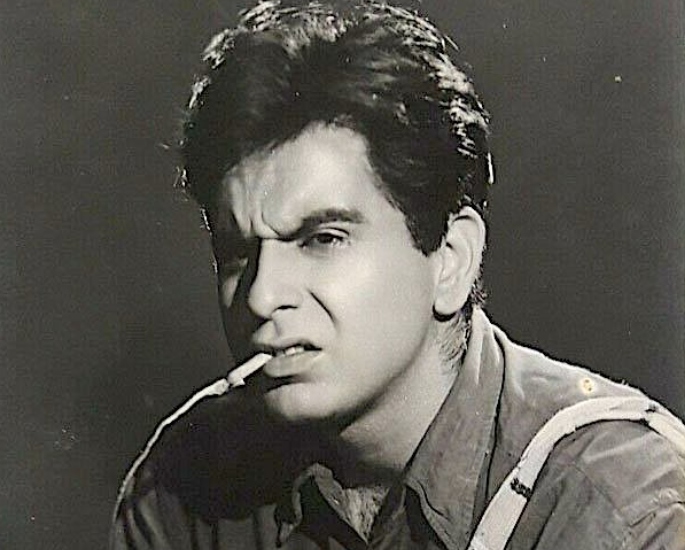
Director: Zia Sarhadi
Stars: Dilip Kumar, Meena Kumari
In this tale of greed and helplessness, Dilip Kumar stars as Noshu. He is a journalist that desperately wants to live independently.
However, his journalism career is not going well as he does not manage to acquire a regular salary.
In Footpath, Meena Kumari portrays Mala, the love interest of Dilip Sahab. She and Noshu are deeply in love.
Tired of conflict and financial insecurity, Noshu turns to illegal trade so that he can earn decent money.
Dilip Sahab depicts this character arc from an honest journalist to a guilty millionaire charismatically.
The film gets even more interesting when the passion for journalism refuses to leave Noshu.
He writes about his fellow black marketeers under a pen name. Near the end of the film, Noshu regrets what he has become in a miserable monologue:
“I can smell rotting bodies from my body and can hear the cries of broken children in my breath.
“I am not a man but a murderous monster.”
The anguish he presents in Footpath proves what a fine performer he is.
Azaad (1955)
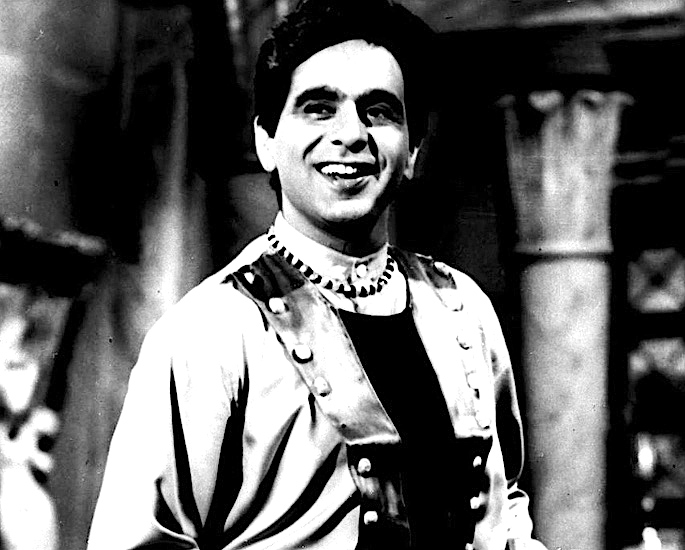
Director: SM Sriramulu Naidu
Stars: Dilip Kumar, Meena Kumari
In Azaad, Dilip Kumar divulges into versatility once more. Playing the role of a bandit in the disguise of a rich man, he creates a very powerful character.
Dilip Sahab portrays Kumar, also known as Azaad and Abdul Rahim Khan. He wins the affections of the beautiful Shobha (Meena Kumari).
Shobha desires to marry Kumar. However, complications arise when his true bandit identity comes to light.
A particular scene shows Dilip Sahab clad in a black code of clothing. He presents himself as Abdul Rahim, sporting a fake beard. He tells people about the notorious dacoit.
The listeners are blissfully unaware that they are sitting in the presence of the bandit himself.
Dilip Sahab engages both his co-actors and the audience with funny expressions and a rapid pace of dialogue delivery.
Madaboutmovies.com reviews the film in a post. They speak highly about the wide scope of Dilip Sahab’s acting plethora:
“There is a perception among younger audiences that Dilip Saab could only do tragic roles, but as a thespian, he has proved his mettle in all kind of characters.
“In Azaad, we get to see his comic and fun side.”
“One of the highlights of Azaad is that we get to see him in various characters here. It is such a delight to watch him in such a role.”
Madhulikha Liddle from Dustedoff also sheds a positive light on Azaad:
“It’s entertaining, good-looking, good listening. A definite addition to my ‘rewatch’ pile.”
In his autobiography, Dilip Sahab reveals the priceless effect Azaad had on him as an actor:
“Azaad, in many ways, was the first film that gave me the much-needed confidence to forge ahead with a feeling of emancipation and sense of achievement.”
His accomplishment surely creates a spell on viewers.
Azaad became one of the most memorable Bollywood films of 1955. Dilip Sahab also won a ‘Best Actor’ Filmfare Award in 1956 for this film.
Devdas (1955)
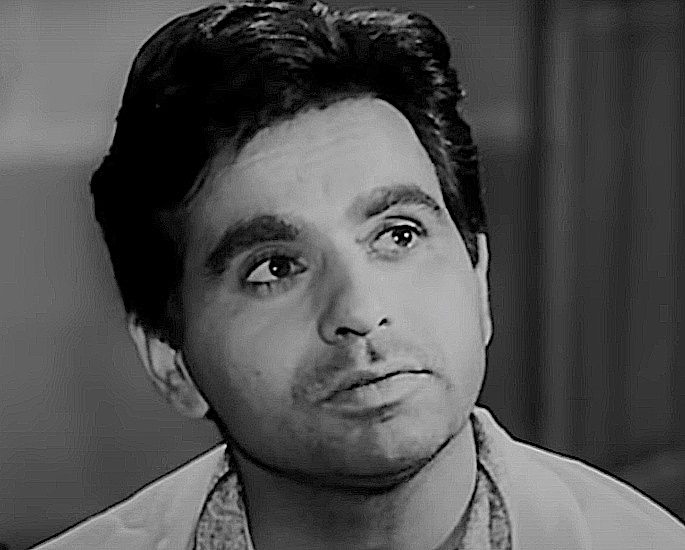
Director: Bimal Roy
Stars: Dilip Kumar, Suchitra Sen, Vyjayanthimala
Many older fans of Dilip Kumar love and cherish Devdas. Acting in his most tragic role, the legend does full justice to it.
In this movie, Dilip Sahab portrays Devdas Mukherjee. Separation from his childhood love Parvati ‘Paro’ Chakraborty (Suchitra Sen) drowns him into rivers of alcohol.
He then falls into the arms of the courtesan Chandramukhi (Vyjayanthimala). Dilip Sahab truly invests his entire being into the role. He utters the infamous dialogue:
“Kaun kambhakt bardaash karne ko peeta hai?” (Who drinks only to tolerate?).
This line is firmly etched into the minds of millions of Indian movie lovers.
His chemistry with Vyjayanthimala is on par. A scene where Chandramukhi smiles at Devdas for the first time is as enchanting as her swaying dances.
Harneet Singh from Indian Express wastes no words in praising Dilip Sahab’s impeccable acting:
“The film would not be what it is without Kumar who plays the role so valiantly and with such haunting sensitivity that his pain becomes a mood.
“In the last scenes of the film, Kumar looks as if he’s literally disintegrating in front of us.
“The entire sequence from the time he gets off the train and takes the cart to reach Manikpur, is breathlessly poignant.”
In a 90s interview, Dilip Sahab singles out this film as one of his favourites:
“I still have a fondness for Devdas.”
Dilip Sahab won the ‘Best Actor’ Filmfare Award for this film in 1957.
Naya Daur (1957)

Director: BR Chopra
Stars: Dilip Kumar, Vyjayanthimala, Jeevan, Ajit Khan
Naya Daur is a rustic drama that features Dilip Kumar as a brave-spirited villager called Shankar. It also stars his popular leading lady, Vyjayanthimala as Rajni.
The film takes off when Kundan (Jeevan) introducing a bus service to his village. This risks the livelihoods of his fellow villagers who make a living by driving tongas (carts).
Shankar accepts a race challenge from Kundan, involving his tonga and the bus.
Much to the dismay of fellow villagers, Shankar holds firm to his beliefs.
Parallel to all this, Shankar and his best friend Krishna (Krishna) both want to marry Krishna. As a result, their friendship suffers:
Shankar confides in his friend Krishna (Ajit Khan) that he wants to marry Rajni. Krishna laughs and tells him not to joke.
In her review for The Quint, Mansi Dua says despite the long duration of the films, she could not even blink away momentarily:
“Naya Daur is almost three hours long, but I couldn’t look away even for a second.
“As always, the legendary Dilip Kumar does not disappoint. He plays the righteous and moralistic Shankar to a tee, making the viewers fall in love with him.”
The flair of Dilip Sahab bursts within the sentiments of Mansi.
Iconic filmmaker Yash Chopra was an assistant director for Naya Daur. Yash Ji writes about watching Dilip Sahab at work during the production:
“[Dilip Sahab] was extremely serious about his work; emotions just naturally surfaced when he was in before the camera.
“In the final take, therefore he invariably did what he felt was best.”
Not only was Dilip Sahab a great performer in Naya Daur, but he also was a thorough professional.
The film contains the evergreen song, ‘Ude Jab Jab Zulfen Teri.’ It is a dance number featuring Dilip Sahab and Vyjayanthimala Ji.
Dilip Sahab won a Filmfare Award for ‘Best Actor’ in 1958.
Naya Daur was also an inspiration to the Oscar-nominated Lagaan (2001), particularly with it having a sports relevance. That makes the former all the more iconic.
Madhumati (1958)
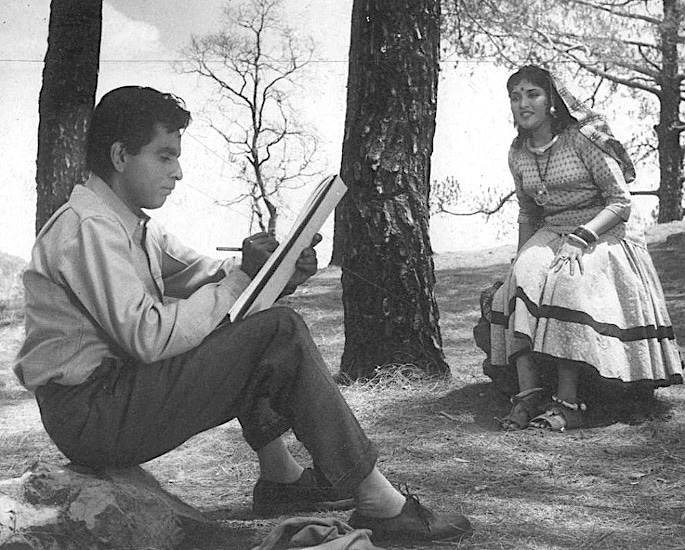
Director: Bimal Roy
Stars: Dilip Kumar, Vyjayanthimala, Pran, Johnny Walker
Madhumati sees Dilip Kumar tackle yet another genre of film. This movie has a suspense romance story.
Dilip Sahab stars as Devinder/Anand. Devinder is an engineer, who explains the story of his life as Anand.
Anand is an estate manager, who is haunted by the ghost of his deceased lover Madhumati (Vyjayanthimala).
In an eerie scene, Madhumati’s ghost returns to haunt Anand. The house is dark, with several iconographies taking place that conjure the conventions of suspense.
A terrifying wind makes the curtains swirl and the film reverberates with slamming doors. A petrified Raj Ugra Narain (Pran) makes a break for it.
Anand, meanwhile, is calm and collected. He is more curious about the ghost. Dilip Sahab, in his inimitable tone, utters the line:
“How do you know all this about me?”
His way of asking is more like the inquisitiveness of a child as opposed to the fear of an adult.
Shoma A Chatterjee, from Cinestaan, talks glowingly of Dilip Sahab’ portrayal in the film:
“Dilip Kumar does more than justice to his role of Devendra in two phases – the first when he finds himself falling in love with this tribal beauty, innocent, ignorant and naïve.
“The second when he pines for her in grief, driven to a point where people think he is ‘possessed’ by Madhumati’s ghost.”
Aamir Khan, Rani Mukherji, and Kareena Kapoor sat down with Anupama Chopra to discuss Talaash: The Answer Lies Within (2012).
When asked about what boundaries their film will break, they reply:
“It’s a very unusual film for mainstream cinema. All the suspense drama films have been smash hits.”
They then cite Madhumati as an example. The film has also inspired Shah Rukh Khan’s Om Shanti Om (2007).
Dilip Sahab brings uncommon themes to the fore in Madhumati. The film is a tremendous piece of art.
Kohinoor (1960)
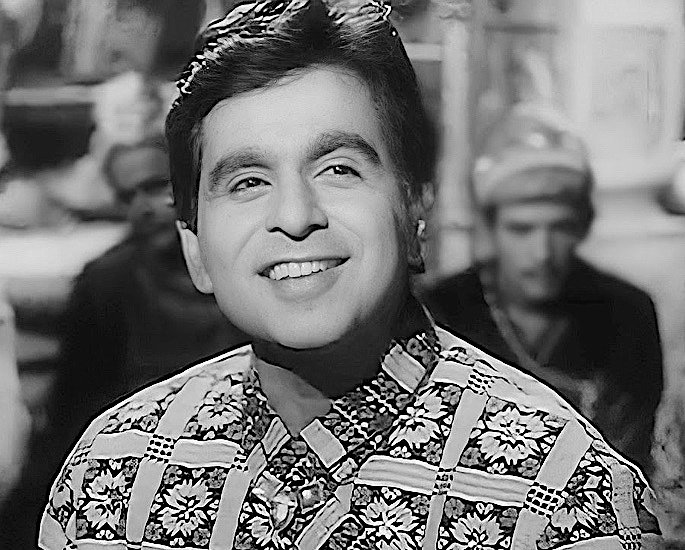
Director: SU Sunny
Stars: Dilip Kumar, Meena Kumari
During his career, Dilip Kumar was advised to try lighter characters., with Kohinoor being a classic example of that.
In the film, he portrays Rajkumar Dhivendra Pratap Chandrabhan. He is an injured royal who is promised to Princess Chandramukhi (Meena Kumari).
There is a scene in Kohinoor where Dilip Sahab imitates another royal, with so much finesse.
It comes across as if Dilip Sahab is the royal’s reflection, but with a different face.
The movie also contains the lilting number, ‘Madhuban Mein Radhika Nache Re.’ It is a scintillating song sung by Mohammad Rafi.
It presents Dhivendra crooning along with Chandramukhi’s oscillating dance. The song, and the film itself, are memorable as they feature Dilip Sahab playing the sitar.
However, Dilip Sahab did not just drum his fingers to the music of Naushad. He actually learned how to play the instrument. He, therefore, displays his dedication once again.
In his personal memoir, Dilip Sahab discusses his indelible memories of Kohinoor:
“Kohinoor will remain etched in my mind for the efforts I made to learn to play the sitar.
“It gave me another chance for me to test my flair for the comedy genre in acting.”
Many people remember this film for Dilip Sahab’s passion and doing full justification to his role. He was a committed actor like no other.
The legend adds that Kohinoor was another film that provided him with a feeling of “achievement.”
In 1961, Dilip Sahab won the ‘Best Actor’ Filmfare Award for Kohinoor.
Mughal-E-Azam (1960)
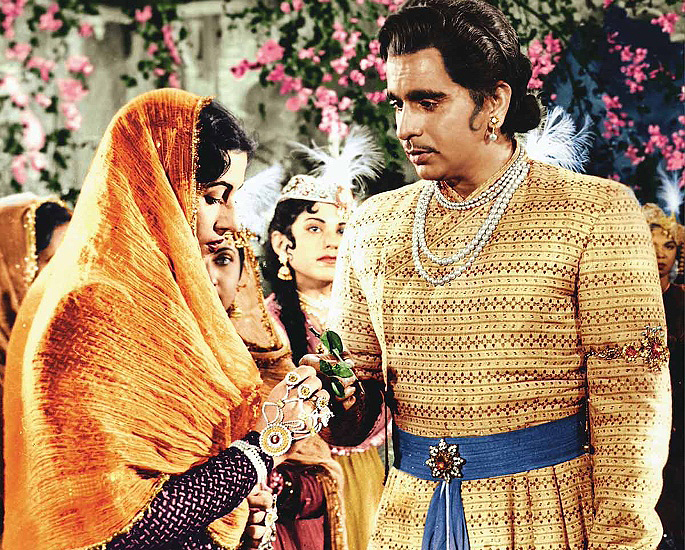
Director: K. Asif
Stars: Prithviraj Kapoor, Madhubala, Dilip Kumar
Mughal-E-Azam is at the highest elevation when it comes to the most enduring classics of Indian cinema. It features Dilip Kumar as the spoilt Prince Salim.
The domineering Emperor Akbar (Prithviraj Kapoor) controls the prince’s life. He is enraged to learn of his son’s love affair with the maid’s daughter Anarkali (Madhubala).
This conflict creates one of the most tragic stories ever seen on celluloid. The emperor’s moral dilemma leads to him freeing an imprisoned Anarkali.
Salim, meanwhile, is distraught when he is told that Anarkali has been executed. He never learns that the love of his life is in fact alive.
Mughal-E-Azam is often remembered for the enormity of Prithviraj Ji. People still swoon over the ethereal beauty of Madhubala in the movie.
Fans will not forget Dilip Sahab and powerhouse performance in a film, which offers so much for a period drama.
Though this epic has romance and tragedy at its core, the film also brings conflict, comedy, and rebellious nature to the fold.
Writing for the BBC in 2002, Laura Bushell describes the film as a setting stone, with its magnificent display and direction:
“A benchmark film for both Indian cinema and cinema grandeur in general.
“It’s a credit to K. Asif’s dedication that the film remains one of the most memorable Bollywood films around today.”
The dedication was truly a big factor in Mughal-E-Azam. It was over ten years in the making.
The chemistry between Dilip Sahab and Madhubala Ji continues to win hearts. There is an iconic scene where Salim brushes a feather on Anarkali.
The emotion Dilip Sahab portrays in that scene is just timeless.
In a documentary, headed by Bollywood’s ‘Baadshah’ Shah Rukh Khan, several Bollywood stars share their thoughts about the film:
Priyanka Chopra-Jonas echoes the notion of idealism:
“Mughal-E-Azam is one film which reiterates what love should ideally be.”
The film ranks high across film art, with Dilip Sahab at the very heart of it.
Ganga Jumna (1961)

Director: Nitin Bose
Stars: Dilip Kumar, Nasir Khan, Vyjayanthimala
Ganga Jumna marked Dilip Kumar’s first foray into film production. He also wrote the script of this film himself.
The movie is a story of two brothers called Gangaram ‘Ganga’ (Dilip Kumar) and Jumna (Nasir Khan). Interestingly, Nasir Ji was Dilip Sahab’s real-life brother too.
A prison sentence and a cruel landowner lead Ganga to join a group of bandits. Meanwhile, Jumna remains a sincere police officer.
Ganga also falls in love with Dhanno (Vyjayanthimala). This is another movie that showcases the beautiful pairing of Dilip Sahab and Vyjayanthimala.
As Ganga is a villager, he speaks the Indian language of Awadhi. Dilip Sahab not only speaks the language but also masters it.
At the launch of Dilip Sahab’s autobiography, Amitabh Bachchan compliments his idol during his speech:
“It was very difficult for me to imagine how someone who did not come from Uttar Pradesh or Allahabad was able to pronounce and enact all the nuances that were required in Awadhi.”
“That has been the ultimate performance for me.”
The plot of two brothers on opposing sides of the law has influenced many Bollywood films. This includes the classic Deewaar (1975) starring Amitabh and Shashi Kapoor.
There is a popular kabaddi scene in the emotional movie, capturing a hilarious competition between Dhanno and Gunga.
However, the most emotional and dramatic scenes occur between Ganga and Jumna.
Vyjayanthimala Ji remembers how Dilip Sahab helped her speak Awadhi for the role.
Not even Dilip Sahab’s prolonging illness could erase the memory of Gunga Jumna from his mind:
“When he was reminded of her character from Gunga Jumna, he immediately flickered his eyes and opened them, when he heard that name.”
Gunga Jumna is a great film, with Dilip Sahab proving his skills behind the camera as well as in front of it.
Leader (1964)
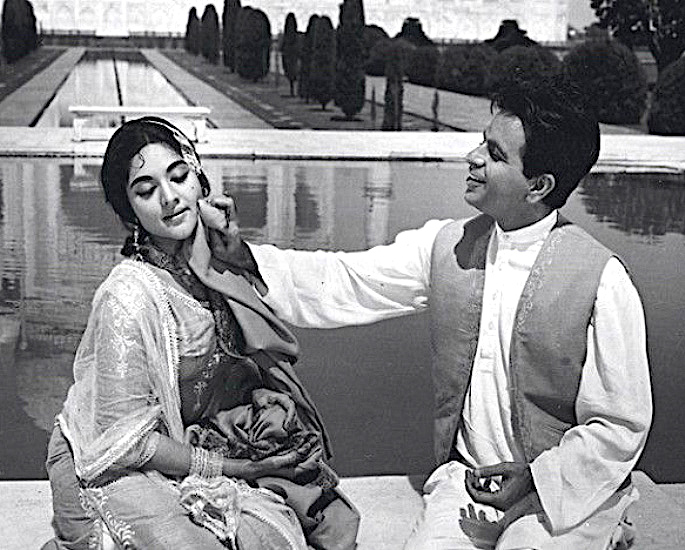
Director: Ram Mukherjee
Stars: Dilip Kumar, Vyjayanthimala
Leader was an acting comeback for Dilip Kumar after a gap of three years. The film is based on a story written by the Devdas (1955) actor.
Dilip Sahab plays Vijay Khanna, a tabloid editor. He gets attracted to Princess Sunita (Vyjayanthimala).
An accusation of murder on Vijay leads the couple to set out to expose a criminal politician. As in their previous films, their onscreen presence is wonderful.
In a comedic scene, Vijay runs away to escape a beating. The genuine terror in his eyes makes the scene serious and funny at the same time.
The ability to convert genres is what makes Dilip Sahab a genius.
In the track, ‘Apni Azaadi Ko Hum,’ he shows how well-versed he is while performing songs. The number echoes with patriotism and courage.
His facial expressions and arm movements alight a fire of passion in the audience on and off-screen.
The director of Leader is Ram Mukherjee. He was the father of superstar actress Rani Mukherjee.
He writes about how Dilip Sahab’s acting has prolonged the longevity of Leader:
“If you watch Leader today, you will find some of the lines spoken by Dilip Sahab so relevant to the present political climate.
“It just goes to prove how far-sighted he was as an intellectual.”
Leader will be remembered for the huge screen presence of Dilip Sahab. He was an actor who could eclipse any scene, while still giving his co-actors the scope to shine.
He won a ‘Best Actor’ Filmfare Award for Leader in 1965.
Ram Aur Shyam (1967)
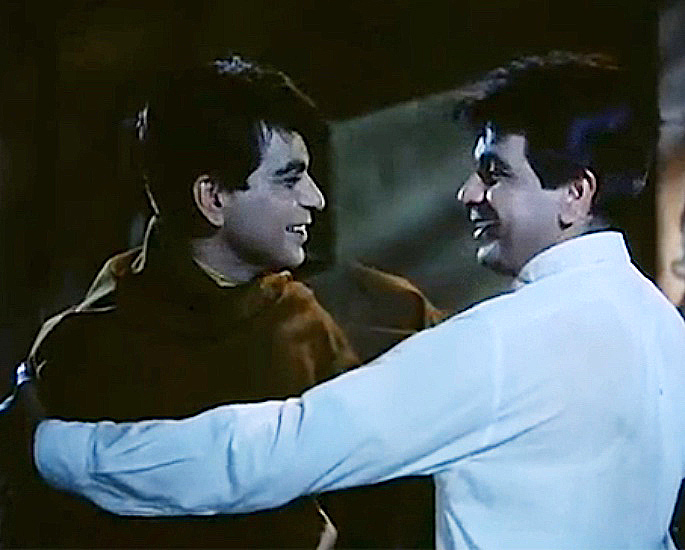
Director: Tapi Chanakya
Stars: Dilip Kumar, Waheeda Rehman, Mumtaz, Pran
Ram Aur Shyam is widely recognised for Dilip Kumar in his first dual role.
He plays Ram Mane and Shyam Rao. In this film, Dilip Sahab shows the fantastic transition between the contrasting characters.
Ram is quiet and tormented by the cruel Gajendra Patil (Pran). He also has a clean heart and is soft-spoken. These traits attract the kind-hearted Shanta (Mumtaz).
Paradoxically, Shyam is boisterous, loud, and brave. This appeals to Anjana (Waheeda Rehman).
Through rib-tickling circumstances, the lives of Ram and Shyam intertwine. Shyam finds himself in Ram’s house.
Gajendra is oblivious to the true identity of Shyam. He finds it shocking when the presumed Ram stands up to him.
A scene where Shyam whips Gajendra induces catharsis and passion in the audience.
There is also an earlier scene where Ram gets kicked out of a cafe, confusing him with Shyam who has cleaned out their kitchen.
However, the ultimate scene from the film is when Shyama humorously eats away chicken and boiled eggs, much to the annoyance of Gajendra.
Portions like this are a delight to watch and represent the trance to which Dilip Sahab could pull the audience.
The climax where brothers Ram and Shyam reunite and unite against Gajendra is entertaining.
It showcases the aura of Dilip Sahab, while also suggesting the visual advancements of Indian cinema.
Co-star Mumtaz shares her reaction to working with the legend:
“I was so happy seeing a star like him agreeing to work with me. He is like a Taj Mahal. He will never fade away.”
Dilip Sahab reached the zenith of stardom with Ram Aur Shyam. He won a ‘Best Actor’ Filmfare Award for this film in 1968.
Kranti (1981)

Director: Manoj Kumar
Stars: Dilip Kumar, Manoj Kumar, Shashi Kapoor, Hema Malini, Shatrughan Sinha, Parveen Babi
Kranti is an action film made on a great scale. This period drama marked the acting return of Dilip Kumat after a five-year hiatus.
Along with Dilip Sahab, who plays Sangha, the film boasts of a hugely impressive star cast.
It includes Manoj Kumar (Bharat), Shashi Kapoor (Shakti), Hema Malini (Surili) and Shatrughan Sinha (Karim Khan).
Parveen Babi also has a minor role as Rajkumari Meenakshi. Although many talented icons decorate the screen, it is Dilip Sahab who dominates Kranti.
Sangha is a freedom fighter, who wishes to free India from the British regime. There is a scene in Kranti when he is tied up in chains.
Sporting an unkempt beard, with his hands covered in blood, he shouts the line:
“I am a traitor of my country. My country is attacking my conscience and it says:
“‘You have not been able to free your land from the British. Shame on you, Sangha’.”
Dilip Sahab is fervent in this scene. One can feel Sangha’s patriotism bubbling within him.
The pain and subsequent gunfire he engages with during the village massacre is also extraordinary.
Director and co-star Manoj Ji opens up on working with Dilip Sahab. The Upkar (1967) actor is a self-confessed Dilip Kumar fan.
“We only had Dilip Kumar in mind for Kranti. When I told him the story of Kranti, he said yes in two minutes. I was overjoyed.
“I would keep looking at him, observe how he would be on sets and how he would perform so effortlessly.”
Manoj Ji, while penning a tribute afterword to Dilip Sahab in his latter’s book also comments:
“All through the making of Kranti, he inspired the entire cast with his dedication and commitment.”
The sentiments of Manoj Sahab show just how magnetic Dilip Sahab was as a performer in Kranti.
Shakti (1982)

Director: Ramesh Sippy
Stars: Dilip Kumar, Amitabh Bachchan, Raakhee, Smita Patil, Amrish Puri
In the 80s, Amitabh Bachchan was the reigning superstar. So, naturally, there was a lot of interest when he was cast with Dilip Kumar in Shakti.
Many were intrigued to know what this casting coup of two superstars from different generations would bring.
The fact that it was directed by Ramesh Sippy of Sholay (1975) fame only added to the curiosity.
In this film, Dilip Sahab plays DCP Ashwini Kumar. He is an unrelenting police commissioner, who wishes to do his duty with utmost sincerity.
The problem arises when his young son Vijay Khanna (Amitabh Bachchan in adulthood) is kidnapped.
Ashwini has to choose between saving Vijay’s life by releasing a criminal or allowing his son to die. The commissioner chooses the latter.
Though he escapes unharmed, Vijay is devastated and tormented by his father’s refusal to save him. The profound mental impact carries on in the character throughout the movie.
There are many confrontational scenes, which are filled with power and sadness between the father and son.
All of this takes a toll on Sheetal Kumar (Rakhee Gulzar), Vijay’s mother and Ashwini’s wife,
Consequently, she later dies. The canyon between both men is momentarily bridged at her funeral.
They cuddle together. Dilip Sahab conveys a lot without saying a word. His family friend, Faisal Farooqi tweeted this scene as his favourite from the actor’s official Twitter account.
Ashwini is later forced to shoot and kill Vijay. In Vijay’s dying moments, Ashwini affectionately tells his son:
“I love you, my son.”
This line leaves the viewers with moist eyes. Sippy Ji describes working with Dilip Sahab as his greatest experience as a director.
At the time, Amitabh was a more marketable star than Dilip Sahab. However, the success of Shakti went to the latter.
In 1983, Dilip Sahab won his eighth ‘Best Actor’ Filmfare Award for Shakti.
Mashaal (1984)

Director: Yash Chopra
Stars: Dilip Kumar, Waheeda Rehman, Anil Kapoor, Rati Agnihotri, Amrish Puri
Mashaal is directed by none other than Yash Chopra. In the 50s, Yash Ji assisted on the sets of the Dilip Kumar starrer Naya Daur (1957).
But this time around, he got the chance to direct the legend. In Mashaal, Dilip Sahab plays a journalist called Vinod Kumar.
Vinod is married to Sudha Kumar (Waheeda Rehman). The elderly couple later take black marketeer Raja (Anil Kapoor) under their wing.
Through Vinod’s guidance, Raja soon turns into an aspiring reporter. He even finds love in the pretty Geeta (Rati Agnihotri).
Dilip Sahab is tender and strict in Mashaal. The song, ‘Holi Aayi Re‘, featuring all four characters, paints a picture of love and harmony.
However, this is all destroyed when drug trafficker SK Vardhan (Amrish Puri) masterminds the eviction of Vinod and an ailing Sudha.
Any discussion about Mashaal is incomplete and unjustified without the mention of one particular scene.
That scene involves Vinod and Sudha wandering helplessly on a road at night. Sudha then falls gravely ill. Clutching her gut, she is in urgent need of medical attention.
Vinod shouts in the road, desperately trying to stop cars.
He bangs windows but they remain closed. No vehicles come to his aid either.
That scene is etched in the memory of millions. Waheeda Ji speaks about the eternal life of that scene:
“Our sequence in Yash Chopra’s Mashaal, our last film together where he tries to stop a vehicle to take me to the hospital, is talked to this day.”
It is said that Dilip Sahab rendered the scene in one take and left all unit members teary-eyed.
The actor helming this scene is just as memorable as the scene and the film in its entirety.
Duniya (1984)

Director: Ramesh Talwar
Stars: Ashok Kumar, Dilip Kumar, Rishi Kapoor, Pran, Amrish Puri, Amrita Singh
Duniya stars Dilip Kumar as Mohan Kumar, an honest and hard-working manager of a shipping company.
His life turns upside down when three company employees frame him for his friend’s murder. As a result, Mohan has to serve 14 years in prison.
Things get worse when, upon release, Mohan discovers that his son Ravi (Rishi Kapoor) has started working for his betrayers.
This makes for a compelling watch and allows Dilip Sahab scope for a striking performance.
One of Mohan’s traitors is Balwant Singh Kalra (Amrish Puri). In a titanic scene, Mohan confronts him.
In a calm voice, he vents out all his anger, with one of the culminating lines being:
“The question is, Balwant, where, on this ugly face of yours, should I fire my gun?”
Mohan then recites all of Balwant’s facial features, linking them to the latter’s sins for which the former had to pay the price.
Dilip Sahab plays the role with so much intensity that it is impossible not to laud his acting skills.
One really feels the mental pain Mohan has endured. That is why there are oceans of catharsis when Mohan kills Balwant.
Mohan also takes revenge on Prakash Chandra Bhandari (Prem Chopra) and Jugal Kishore Ahuja ‘JK’ (Pran).
Dilip Sahab proves that age is no barrier to talent with Duniya being a prime example of that.
Karma (1986)

Director: Subhash Ghai
Stars: Dilip Kumar, Nutan, Anil Kapoor, Jackie Shroff, Naseeruddin Shah, Anupam Kher, Sridevi, Poonam Dhillon
In Karma, Dilip Kumar plays Rana Vishwa Pratap Singh, who is a respectable high-ranking police officer.
This film also marks the first time Dilip Sahab is onscreen with the veteran actress, Nutan Behl. He also shares screen space with Anil Kapoor, Jackie Shroff, and Naseeruddin Shah.
Rana imprisons the head of a terrorist organisation. The criminal is Dr Michael Dang (Anupam Kher).
In a strong scene, Rana slaps Michael. The convict is horrendously insulted as he declares:
“I will never forget this slap!”
To this, an amused Rana replies:
“You should not either. I am glad that you now have experience of an Indian slap.”
This scene is iconic as Dilip Sahab perfectly layers it with sobriety and touches of humour. Millions can relate to that ‘Indian slap’.
5 Unique Facts on Dilip Kumar's Top Movies
- He once told off the crew of ‘Shakti’ (1982) for not letting Amitabh Bachchan rehearse.
- The famous road scene in 'Mashaal' (1984) is inspired from his father pleading for medical help to save his brother.
- He took inspiration for some of the dialogues in 'Ram Aur Shyam' (1967) from his older sister.
- He asked the cameraman in 'Ganga Jumna' (1961) to shoot his death scene from a distance.
- He participated in the dialogue scripting of 'Devdas' (1955).
When Rana is placed on life support after an attack, it is unclear as to whether he will survive.
The melancholy with which Dilip Sahab portrays this vulnerable side is despondency at its best.
Therefore, when Rana does survive and completes his mission by killing Michael, Dilip Sahab wins applause from the audience.
For Dilip Sahab’s acting, despair, and perhaps also for a first-time casting, Karma will be locked in many minds.
Dilip Sahab was an actor of gravitas, depth, and mastery. He could eclipse any film and lure the audience into countless different worlds.
He chose to retire from the limelight during the late 90s. Thus. ending a career of five and a half decades.
However, his fanbase remains intact. Many younger actors including Amitabh Bachchan and Aamir Khan have cited Dilip Sahab as their teacher.
Fresh-faced, 90s-born actor, Ishaan Khattar also names Dilip Sahab as his favourite actor.
In 1994, Dilip Sahab was awarded the Dadasaheb Phalke Award. This is India’s highest award for contribution to cinema.
He is an institution in himself and has done many immortal and memorable films.
There will only ever be one Dilip Kumar. He has an unforgettable legacy, which will carry on forever.






























































